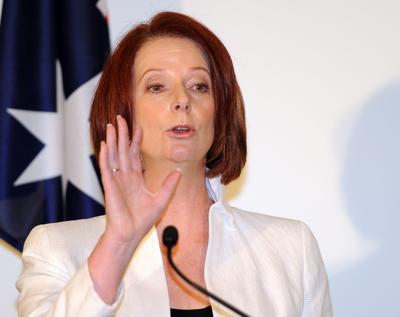One of the few areas of policy progress is on the international front, particularly Australia’s regional engagement.
Viewed from outside, Australia must appear to be enjoying ongoing prosperity and good fortune. And indeed it is, with a long boom that began under former Liberal Prime Minister John Howard, and has continued under Labor leaders Kevin Rudd and Julia Gillard – interrupted by only a brief dip in growth for the global financial crisis. It is a trajectory unmatched over the past decade among OECD countries. It reflects the fruits of policy reform back in the 1980s, sound economic management and conducive international conditions – especially in Asia.
Viewed from within, the scene is much less comforting. With a handful of exceptions, there is little real progress in addressing serious policy challenges facing the country. Major economic reform has stalled. Large-scale water management reform and preparation for possible climate change have been derailed. Comprehensive tax reform has been mooted and abandoned, and coordination between the federal and state governments on healthcare reform is a fading dream.
Part of the explanation for the policy malaise is the divided condition of the Australian Parliament. The federal election this August (following Kevin Rudd’s being dumped as party leader a month earlier) left Labor in power, but dependent on a handful of party independents and a member of the Greens for its survival, to say nothing of the passage of legislation through the upper house. While Gillard appears to have succeeded in crafting a political alliance that will likely see Labor hold power for a full term, the capacity for legislative action has been acutely constrained.
This is a far cry from the situation in Britain, where an unlikely coalition arising from a similarly divided election outcome has yielded extraordinarily decisive government. Inevitably, this invites questions about the calibre and competence of the current Australian government. But a growing number of seasoned commentators are digging deeper to make sense of the lack of commitment to ambitious policy reform. Some link it to an apparent decline of ‘values politics’ – of elected representatives driven by a commitment to advance a given agenda. Attention has focused on a narrowing of the parliamentary gene pool, with MPs and Senators coming not from across the spectrum of society, but increasingly from within their party apparatus or the union movement.
I would add one other underlying factor: a complacency that has crept into Australian society as a result of prolonged prosperity. Australian is no longer seized by the imperative of reform to secure international competitiveness as it was in the face of much more stringent conditions in the 1980s and early 1990s. While it may be comforting to blame a particular crop of politicians, in the end our parliamentary representatives are reflecting the level of commitment to reform that exists across society. As often happens, complacency is the fruit of prolonged good times.
Of course, not everything is adrift. There is significant action on some policy fronts. The most notable domestic example is the planned National Broadband Network. While there is intense controversy about aspects of the design of this massive undertaking, it is proceeding and signals a return of a national appetite for large public infrastructure initiatives of the sort not seen since the 1950s.
Although not well appreciated within Australia, there has also been progress on the international front – particularly with enhanced regional engagement. Kevin Rudd’s Asia-Pacific Community initiative has come to life – in the form of the expanded East Asian Summit – with the emergence of US support for it and ASEAN countries taking ownership of it. Progress with multilateral initiatives of this sort is inherently difficult, but it has come to pass. It remains now to be seen what supporters of the framework – such as Australia – can do to enhance the region through it.
Australia has also forged remarkably effective bilateral links with a surprising but effective trio of collaborators: Indonesia, Korea and Vietnam. Despite very sharp bilateral political disagreement between Australia and Japan over whaling, there has been progress made on strengthening defence collaboration between Australia and Japan.
Perhaps the most intriguing recent regional initiative from Australia relates to Prime Minister Gillard’s pursuit of a ‘regional solution’ to the steady flow of asylum seekers – legitimate and otherwise. Gillard has been widely ridiculed for her proposal for a regional processing centre in East Timor. There is no question that the idea has been presented in an artless, clumsy manner. The Government will, legitimately, continue to attract barbs for this. But that does not mean the underlying instinct – that a regional, rather than national solution must be found – is wrong-headed. The key to this, for Australia, is Indonesia and ASEAN more broadly. No country can handle this problem on its own. Australia’s geographic circumstances demand that it do so in concert with the countries to its north. As a recent and productive Australia-New Zealand-ASEAN Dialogue revealed, there is potential for a real strengthening of collaboration on this front.
While the good times continue to roll, unfortunately, Australia is likely to continue to experience domestic division and drift on many policy fronts. If so, let’s hope there is improvement on the regional front.
Andrew MacIntyre is Dean of the College of Asia and the Pacific at the Australian National University.
This is part of a special feature: 2010 in review and the year ahead.

